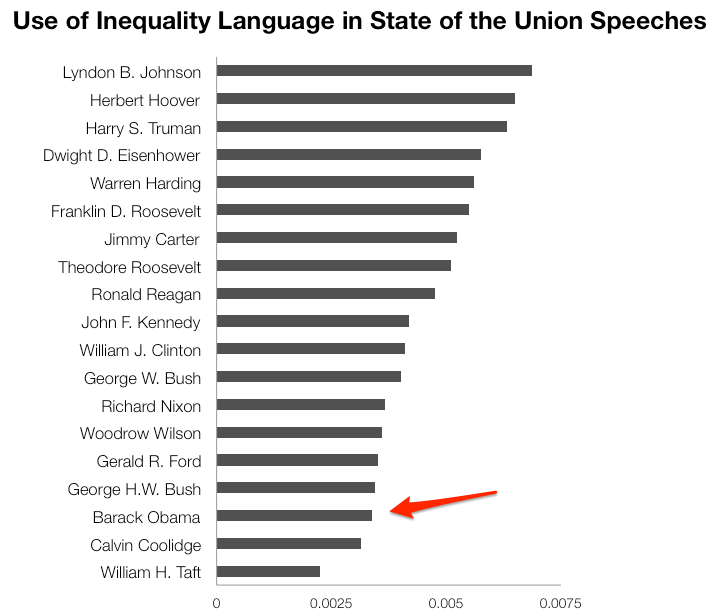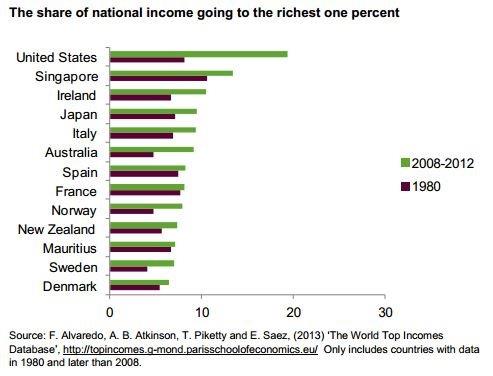Is President Obama a laggard or a leader on inequality?
 This chart by Oxfam and Dave Goodsmith captures how often Presidents have used words related to economic justice in 100 years of State of the Union addresses,
This chart by Oxfam and Dave Goodsmith captures how often Presidents have used words related to economic justice in 100 years of State of the Union addresses,
Oxfam’s analysis of State of the Union Addresses shows no President has spoken less about inequality since the Great Depression. Will Obama change that tonight?
Oxfam’s analysis of State of the Union Addresses over the past 100 years shows no President has spoken less about inequality since the Great Depression. Will Obama change that tonight?
Co-written by Paul O’Brien, Vice President for Policy and Campaigns at Oxfam America, and Ricardo Fuentes-Nieva, Head of Research at Oxfam Great Britian
“There is only one thing in life worse than being talked about, and that is not being talked about.” ~Oscar Wilde
President Obama revised his State of the Union Address over the last few days, to replace talk of “inequality” with more benign rhetoric around “opportunity.” What a shame!
Working with data analyst Dave Goodsmith, Oxfam examined how Presidents over the past 100 years have used eleven key words on inequality in their annual State of the Union to Congress. Here is how President Obama compares:
Oxfam is still hoping President Obama will shift from laggard to leader tonight, and perhaps even surpass President Lyndon Johnson’s war on poverty speech. Here’s three reasons why:
#1 – President Obama already signaled his commitment to tackle inequality.
Just one month ago, President Obama declared his intent to put economic inequality front and center for the remainder of his administration. In fact, Obama called inequality “the defining challenge of our time,” and pointed to a “growing deficit of opportunity” for hardworking Americans. Except for President Johnson’s 1964 State of the Union address where he famously declared a “war on poverty,” no other President comes close to tackling this issue so forcefully. (You can hover over the circles to find out more information on specific speeches. Presidents are grouped by color. Not the highest number and percentage of economic justice words appeared in Obama’s speech in December 2013.)
Economic Justice Words in SOTU speeches: 1900-2013
#2 – Inequality is growing and reaching levels not seen in decades.
Last week, Oxfam published a report entitled “Working for the Few: Political capture and economic inequality,” showing that the richest 85 people in the world hold as much wealth as the poorest 3.5 billion. In the United States alone, the 20 richest people hold as much wealth as 150 million of the poorest Americans. Between 2009 and 2012, the wealthiest 1 percent of Americans captured 95 percent of post-financial crisis growth, while the bottom 90 percent became poorer.
Today, the top 10 percent possess 80 percent of all financial assets. The share of income going to the richest 1 percent in the United States has increased more than in any other country for which we have data since 1980, as indicated by the graph from our report below:
#3 – Rising inequality has shifted American public opinion.
Americans may distrust terms like “wealth redistribution,” but as levels of inequality change, so too does public opinion. Poverty, hunger for economic opportunity, and strong public support to address inequities are what allowed President Franklin Roosevelt and Congress to craft and pass landmark New Deal legislation in the mid-1930s.
A recent report on an Oxfam survey of low-wage workers in the United States, entitled “Hard Work, Hard Lives,” showed that 65 percent believe Congress passes laws that benefit the wealthy, even though one in three Americans—more than 100 million—is either in poverty or among the ranks of the working poor. And surprisingly, Gallup reports that more than three-fourths of Americans support raising the minimum wage, including 58 percent of Republicans.
Certainly there is a national and global conversation on inequality emerging. The global reaction to the release of Oxfam’s recent inequality report, Working for the Few, demonstrates this heightened interest. That big spike at the end of the graph below is the reaction to the report release on Oxfam’s global website last week; the other in early 2010 is the Haiti earthquake.
How can President Obama address inequality during and after the State of the Union?
Check out the eleven key words that make up 99% of the word usage from our list over the last 100 years to see how Presidents have spoken about inequality and fairness. (You can click a word or color to highlight it in the graphic, to see just that word represented. Click again to return to the full graphic.)
Top Economic Justice Words in SOTU speeches: 1900-2013
Let’s see President Obama’s leadership and how often he uses those eleven key words or finds other meaningful ways to talk about growing inequality in the United States and around the world tonight.
We’ll be tweeting tonight to see how inequality is addressed. Join the conversation by following @OxfamAmerica and the hashtag #InequalityCounts. Stay tuned to Politics of Poverty for Oxfam’s analysis of how this year’s State of the Union compares.


